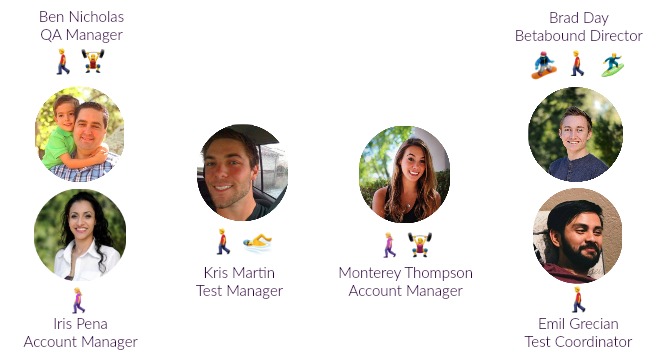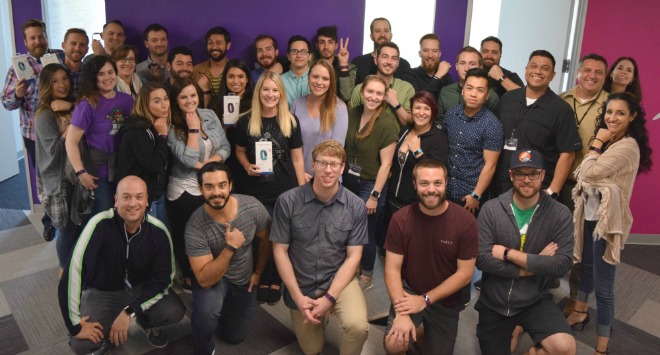Centercode Team Gets Fit with Fitbit

At our recent User Group, the Centercode team was gifted Fitbit Charge 2s by Fitbit’s product team. We interviewed our team to see how they’re adapting to this new tech, what they like and dislike about the Fitbit Charge 2, and their thoughts on the future of wearable fitness tech.
Given the popularity of these devices, we wanted to share our experiences with the Fitbit Charge 2 in an effort to foster a larger conversation about fitness wearables within the Betabound community. So, whether you’re considering purchasing a Fitbit device, or just want to geek out about the emerging wearable fitness tech trend, then this blog post is for you!

Q: What are some of your favorite features about this product?
Emil: I like that Fitbit has active minutes. It’s frustrating when you don’t have time to go to the gym. This product has changed my perception of how my walking or general moving around is considered exercise. That’s been a thought shift for me, and has helped give me peace of mind that I am moving around enough throughout the day to achieve my personal goals.
Kris: I really like the silent alarm because waking up to a bunch of alarm clock noise is a little distressing and surprising at times. I like the fact that my wrist vibrates just enough to wake me up and get my day started. I also like the ability to challenge your friends through the Fitbit app, because it gives people a personalized incentive to increase their daily activity.
Q: Has there been a moment that has particularly pleased, or surprised you, while using this product? If so, can you describe it?
Ben: I wasn’t aware this device would notify me of incoming calls and texts when I first put it on. That feature is really useful and I didn’t expect that!
Iris: I actually first purchased a Fitbit a few years ago for my daughter. She’d been experiencing dizziness and fainting upon standing up. After sharing screenshots of the 30-40 heart rate differences with her doctors, they were able to diagnose her with POTS — an autonomic nervous system disorder that’s commonly misdiagnosed as anxiety or exhaustion. The data from my daughter’s Fitbit has helped point us to better treatment options for her that have drastically improved her quality of life. She wears her Fitbit every day to help manage and maintain her health — making this band less of a fitness tracker and more of a life tracker. Seeing how much Fitbit has helped my daughter, made me excited to try it out myself!
Q: What are your two favorite metrics to track, and why?
Iris: My hours spent asleep and the number of steps I take per day. Sleep just to make sure I’m keeping balance and get myself on a better sleep schedule. Steps because I’ve gone from doing 5,000 steps to 6,000 steps a day. The step tracking helps me understand my fitness and motivate me to achieve new goals as I go.
Brad: The sleep and heart rate metrics are my favorite. The sleep metric helps me understand my sleep cycle, and appreciate that I need to rest more. In fact, I got a medal in the Fitbit app for getting eight hours of sleep the other night! Heart rate because it’s interesting to see how high it goes when I’m rock climbing, or the little spikes in my heart rate right before a stressful call at work. It’s just a neat metric to be aware of.
Q: How is this product helping you achieve your fitness goals?
Monterey: My goals are to be more aware of what I’m doing to my body. I want to better understand how active I actually am since it’s easy to lose sight of that when you’re working in an office environment.
Emil: Being more active and aware of the specific choices that I make. I feel more excited to make the consideration to walk somewhere, rather than drive there, because it’ll get tracked on my Fitbit and it’s fun to check my stats. I like the camaraderie of the in-app challenges feature too. I feel like I walk everywhere just to spite my other competitive co-workers.
Q: Has your Fitbit changed your outlook on your personal health or fitness? If yes, then how?
Brad: According to the Fitbit app, I’m in the green heart rate zone for men my age — so that’s exciting! If I’m doing really well on that fitness side of the spectrum, then I’m doing weaker on the sleep side. My sleep is worse than I thought because Fitbit subtracts all the times you’re restless in the night. So those are the two sides of the spectrum, and I’m now more aware of getting them balanced.
Monterey: My Fitbit has made me realize that I’m more active than I thought I was by putting my day into perspective. I go to the gym every day, and with this device I can associate something tangible with my time spent working out like calories burned, steps taken, active heart rate, etc. rather than something casual like, “I just went to the gym.”
Q: What are some suggestions you have for improving this product?
Iris: I love the device’s meditation feature, so reminders to actually use it would be awesome.
Kris: It’d be great if this product was submersible in water so I could take it swimming. I like to swim a lot, but I find myself opting out of swimming because I won’t be able to track that activity with my Fitbit. Another thought would be to manufacture bigger bands for the device that you could strap on your upper arm or lower ankle — similar to what people do with their iPhones when running. I also play softball, and have to take my Fitbit off because I’m worried about going up to bat or sliding in the dirt with it and the device getting damaged.
Q: Would you recommend this product to a friend? If so, how would you pitch it?
Ben: I would definitely recommend the Fitbit Charge 2 to people. I would pitch it for a couple of reasons. First, it’s easy and convenient and didn’t require a lot of setup — it just works. Second, it gives useful insight into your health and sleep patterns. Plus, it has the added perk of syncing up with your phone for calls and texts — which is a great feature.
Q: Given your knowledge of the customer validation industry, how do you see fitness wearables like Fitbit evolving over time?
Brad: I think the wearables industry needs to figure out how to market products like Fitbit as less of a fitness device, and make it more acceptable to have an interest in tracking your body and sending you alerts about your health. Right now, there’s a weird stigma about wearing a Fitbit that you’re trying to lose weight or improve your fitness. I see the fitness wearables industry normalizing the interest to track personal health data over time, so that the weird stigma with purchasing and wearing a fitness tracker goes away.
Monterey: Minimalism is what people want in the wearable industry. I see wearables getting thinner, more fashionable, having a long battery life, and universal device connectivity being where the industry is going. That’s where the ecosystem is going — connectivity.

Centercode has beta tested a handful of wearable fitness devices — so our team was excited to get their hands on Fitbit’s Charge 2 and share their thoughts with our community of beta testers. If you own a Fitbit (or any other brand of wearable fitness device), we want to hear from you! Comment below with your experiences using your device, or your thoughts on what you agreed (or disagreed) with in this post. Our work in the customer validation industry has taught us that these wearables are here to stay, so we’d love to hear your thoughts on this growing tech trend.